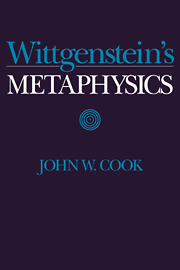Book contents
- Frontmatter
- Contents
- Preface
- List of Abbreviations
- Introduction
- Part I From Idealism to Pure Realism
- Part II The Metaphysics of Wittgenstein's Later Philosophy
- Part III Causation and Science in a Phenomenal World
- Part IV Logical Possibilities and the Possibility of Knowledge
- Part V The Past, Memory, and The Private Language Argument
- 16 Memory, Tenses, and the Past
- 17 Wittgenstein's Analysis of Mental States and Powers
- 18 Following A Rule
- 19 The Private Language Argument
- 20 Names of Sensations and the Use Theory of Meaning
- Name Index
- Subject Index
19 - The Private Language Argument
Published online by Cambridge University Press: 05 November 2011
- Frontmatter
- Contents
- Preface
- List of Abbreviations
- Introduction
- Part I From Idealism to Pure Realism
- Part II The Metaphysics of Wittgenstein's Later Philosophy
- Part III Causation and Science in a Phenomenal World
- Part IV Logical Possibilities and the Possibility of Knowledge
- Part V The Past, Memory, and The Private Language Argument
- 16 Memory, Tenses, and the Past
- 17 Wittgenstein's Analysis of Mental States and Powers
- 18 Following A Rule
- 19 The Private Language Argument
- 20 Names of Sensations and the Use Theory of Meaning
- Name Index
- Subject Index
Summary
In Philosophical Investigations Wittgenstein poses the question whether there could be a language which is private in the sense that “the individual words of this language … refer to what can only be known to the person speaking; to his immediate private sensations,” so that “another person cannot understand the language” (PI, §243). He goes on to argue that there cannot be any such use of words. What Wittgenstein means to criticize here is an idea that is at home in a dualistic view of the world, namely, that whenever I speak of the contents of my mind, I alone can know what I am speaking of. Wolfgang Kohler, himself a dualist, stated the idea as follows:
What is our evidence for assuming that under given conditions the ultimate data of experience are the same for several persons? Unfortunately, we shall never know whether or not this is the case. … We have no proof of agreement even in cases in which all imaginable tests give identical results such as precisely the same verbal reports. One person may always report “red” where another person also says “red.” Still we know only that the first person has throughout a constant quality wherever and whenever the second person talks about red. We do not know that the first person has the same quality as is called red by the second person. […]
- Type
- Chapter
- Information
- Wittgenstein's Metaphysics , pp. 316 - 334Publisher: Cambridge University PressPrint publication year: 1994
- 1
- Cited by



